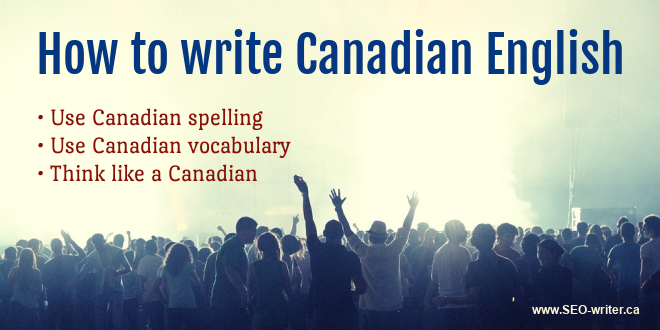Want to communicate with Canadians? Here are the top 10 tips to write for a Canadian audience.
English is not just one language. There are many versions and dialects. In particular, people around the world tend to speak British English or American English. Not so in Canada.
Canadian English is a hybrid of three influences:
- Its original British roots
- The cross-border flow of books and movies from the USA
- The French partnership in this bilingual country
The result is a language that seems to be a cross between UK and USA English, with a few anomalies of its own.
If you plan to write for a Canadian audience, here are a few guidelines that will help you not look like too much of a fool.
We love U
- Canada loves its “u”s. This is a big one, because Americans have eradicated most of their British “u”s. Watch closely how lovely these words look without expunging any of their letters:
- Colour
- Valour
- Vigour
- Honour
- Parlour
- Candour
- Neighbour
- Flavour
- Humour
- Armour
- Clamour
- Parlour
- Odour
- Moustache
- Rancour
- Favour
- Favourite
- Mould
- Harbour
- Tumour
- Vapour
- Savour
Like any good English speakers, we like to keep people off-balance when it comes to spelling. So we lose the “u” on honorary. I know, it’s irritating.
We also love theatre
- Speaker of keeping people off balance, how would you spell the sound rrrrr? As in tiger or ginger? Well, Canadians spell “tiger” and “ginger” the same way as Americans do, but here are some words where they reverse the “e” and the “r”:
- Theatre
- Centre
- Lustre
- Macabre
- Sceptre
- Calibre
- Metre
- Sombre
- Meagre
- Words ending in an “s’ sound are also often different. Instead of encing in “ense”, as in the United States, they end in “ence” in Canada. For instance:
- defence
- offence
- pretence
- licence
- Route is actually spelled route. Americans find this confusing, since we pronounce route like “root”, not like “rout”. But think how you pronounce “youth”, and it all makes sense
- I write a check for my American writers, but I write a checque for my Canadian writers.
- Those Canadian writers spend the money ordering from a catalogue. But the American writers order from a catalog.
- Guess what Canadians wear at night. Pyjamas! Not pajamas.
- Canadian spelling might be closer to British spelling, but they tend to use more American words.
Canadian vocabulary is similar to American vocabulary
- Truck, not lorry.
- Elevator, not lift.
- Washroom (or rest room or bathroom or powder room or the can), not the loo.
- Fries, not chips.
- Sidewalk, not footway.
- Canadians don’t call American cheese anything in particular, but we definitely don’t call it “American cheese”. For anybody reading this from outside the USA, “American cheese” are those waaaaay over-processed, individually-wrapped, orange slices that are loosely based on the concept of cheddar cheese. Canadians do call Swiss cheese “Swiss cheese”, just for the record.
- The last letter of the Canadian alphabet is “zed” not “zee”.
To say that there are dozens of other anomalies would be an understatement. But these are the main ones you should be aware of. Most Canadians read so much American writing, that they are used to American spellings. In fact, many differences in spelling are not known to many Canadians. But the ones in this article are, so please don’t write about mold on American cheese (hint, it is so over-processed that mould doesn’t grow on it, anyway).
Write how Canadian readers think
Note also the subtle differences in attitude between Canadians and Americans. Canadians tend to be more polite, sometimes to an extreme. They also tend to be more reserved about showing emotions or passion in public. In particular, they tend to express patriotism less.
The words Canadians use on Twitter most reveal that Canadians are also happier than Americans.
A brief history of Canadian English
How did Canadian spelling get to be so unique? Its roots are in the American War pf Independence. At the time, Americans were essentially British. However, over a century and a half, Americans had begun to develop somewhat of their own dialect.
Meanwhile, Canadian territory was mostly populated by French-speaking people. Britain had taken “New France” from France in 1763, and all French-speakers willing to pledge allegiance to the British Crown were permitted to stay.
Then came US independence, when two things happened.
First, the newly independent Americans wanted to be as non-British as possible. So their language quickly took on distinguishing features of its own. Noah Webster codified this, in part by removing the “u” from words like favour and honour, and switching the “r” and “e” in theatre and centre.
Second, the United Empire Loyalists fled to British territory, which we now call Canada. These people were Americans, but they were eager to remain as British as possible. In 1890, Sir John A. MacDonald, Canada’s first Prime Minister, had British English officially codified as the language to use in all government documents. This was to prevent creeping Americanisms. So, from an early state, Canadian English had some American aspects, but was essentially British English. Even into the 1900s, Canadians remained British subjects and fought under the British military umbrella.
Meanwhile, Canada and the United States shared geography and strengthened their trading ties. Canadian and American English evolved together, especially as new words were created. So when somebody invented the truck, that’s what we called it. When somebody invented the elevator, that’s what we called it.
Since the Second World War, Canada has been much closer to the United States than to any other country. Canadian English continues to evolve in conjunction with American English. But it retains historical spelling, a testimony to Canada’s British roots.
Read more on the history behind Canadian English.









